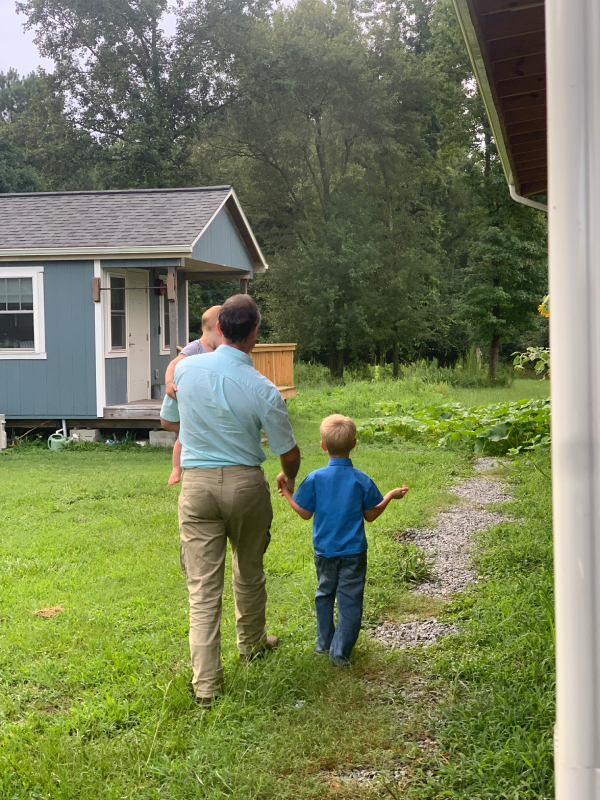
Growing up with a blind brother, I took a lot of things for granted. Our board games were labeled with Braille. The oven and stove controls were marked with puff paint. We stretched a clothesline between trees to mark a path from the house to Dad's cabinet shop. My friends' homes lacked these adaptations. To my young mind that seemed a little exotic.
Whenever we were in a public place, my mom provided running commentary on signs, landmarks, and anything potentially harmful to someone without sight. She read all the museum placards and historical markers out loud (a little embarrassing). She described our surroundings ("The picnic table is in the middle of a concrete slab about 6 inches high"). And she interpreted visual cues that people gave without thinking (He's pointing left."). It’s no wonder that all six of us kids grew up to be talkative adults!
I’ve seen plenty of intelligent, sighted people struggle to relate to my brother. Lack of sight is something that many of us aren’t familiar with. This leads to etiquette blunders and unintentionally rude behavior. I am excited to share this article written by my sister-in-law and mom. It can help you feel more confident the next time you meet someone who is blind or visually impaired.
Awareness for People who are Blind or Visually Impaired
Compiled by LaRosa Bontrager
Inspired by Rosy Bontrager
How do we interact with someone who has a visual disability or blindness?
Many people have never interacted with a blind or visually impaired person. Also, many folks may not be aware that each visually impaired person has individual preferences.
Keep in mind there is no need to treat people with visual disabilities differently. You don’t need special skills to interact with them. Remember that you’re interacting with a whole person, not just their disability. Show them the respect they deserve and offer the following courtesies to people who are blind.
1. Offer help.
If you see a person with blindness who seems to need help, offer your services. Speak directly to the person, not through a third party, and let the blind person know you are addressing them. If your help is refused, that’s okay.
2. Assist a blind person, don't push a blind person.
Pushing isn’t polite. If you want to assist an individual with blindness, offer your arm. Taking your arm or even just your crooked elbow will allow them to follow the motions of your body. If they have a guide dog, ask if they’d prefer to take your arm or follow you with their guide dog.
3. Communicate when you are leaving the presence of a blind person.
Before parting ways with a person who is blind, ask them if they need any assistance. If they do not require anything, again let them know you are leaving.
4. Give helpful directions.
Always give directions to a person with blindness according to the way they are facing. Pointing and giving vague descriptions, such as “over there”, won’t help.
Let them know specifics, “Go straight for about five feet and the door is to the right,” If you must use specific street or landmark names, make sure they are familiar with the area.
5. Don’t change your vocabulary.
It’s okay to use words like “look” and “see” when conversing with a person who is blind. Words like these are likely as much a part of their vocabulary as yours.
6. Blind people, like sighted people, have preferences.
Make sure they are aware of what is going on around them. It’s quite easy for an extrovert to take over a conversation and an introverted blind person is left without knowing what is happening. Make sure a blind person is included in the conversation.
7. Tell a visually impaired person what food is available at mealtime.
When eating a meal with a person who is blind, tell them what is being served. For example, explain the position of the items in front of them, or on the plate, by relating their position to the numbers on the face of a clock.
8. Leave items or objects where they are located.
When visiting the home or office of a person who has blindness, do not move objects around, even if you think you are helping. You may be doing more harm than good. Chances are, the person with blindness knows where they placed their objects and expects them to be where they left them.
9. No sight. No limits.
Most people who are blind will gladly discuss blindness if asked, but remember that it’s an old story to them. They have just as many interests as you do. Don’t make the assumption that their blindness rules their life.
Do they like board games or would they prefer a campfire? What about going swimming, a meander through the woods, or a game of Monopoly?
10. Ask before texting or emailing emojis and GIFs
Often, the screen reader used by a blind person will not interpret emojis and GIFs correctly. Even if it does, it can be distracting. Imagine receiving a text message from a friend, “It was so good to catch up today, smiling face with red hearts.” Weird, right?
To bring It all together please treat people with blindness and other disabilities with respect and consideration. Blindness shouldn’t be the focus of every interaction they have with others. If you can, offer help, but only when it’s wanted or needed. And, of course, make sure to do so in a respectful way. Likewise, remember blind people love to help sighted people as well.
People with blindness are just like everyone else. Being blind does not define them. Think about how you want people to treat you and act accordingly. You might just find out you are more alike than different.
The only thing worse than being blind is having sight but no vision -Helen Keller











